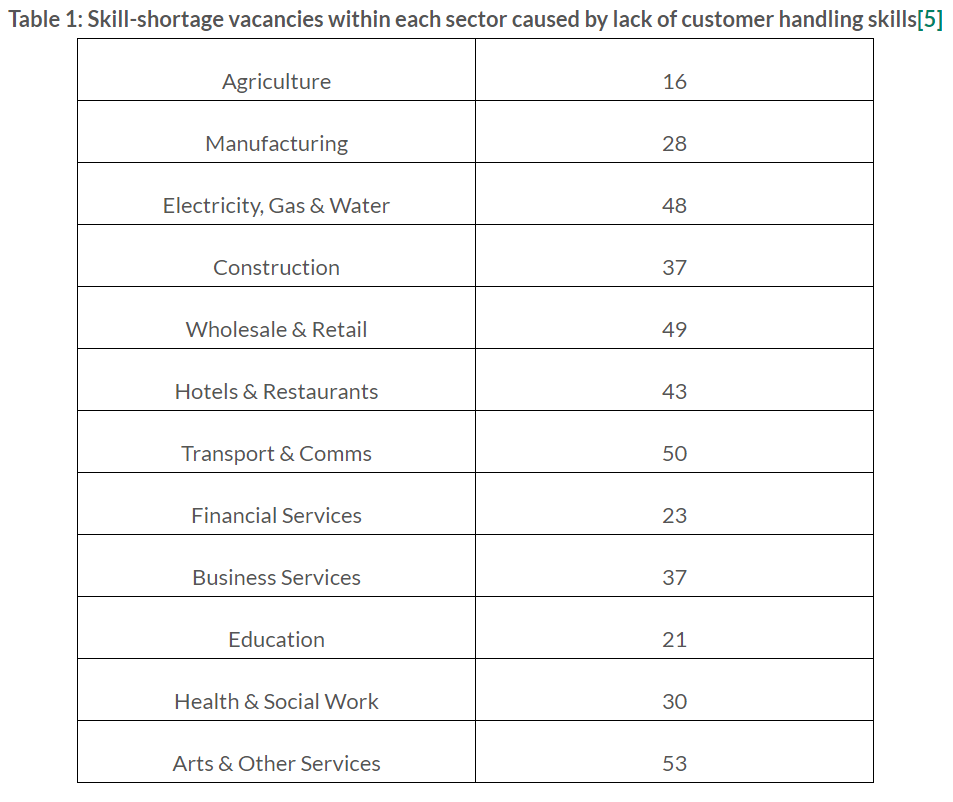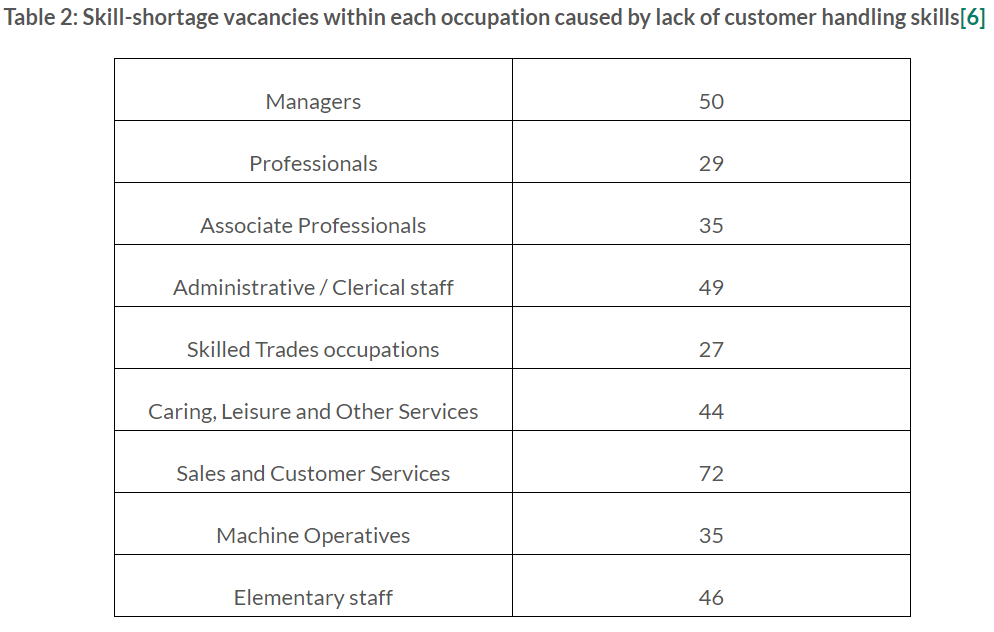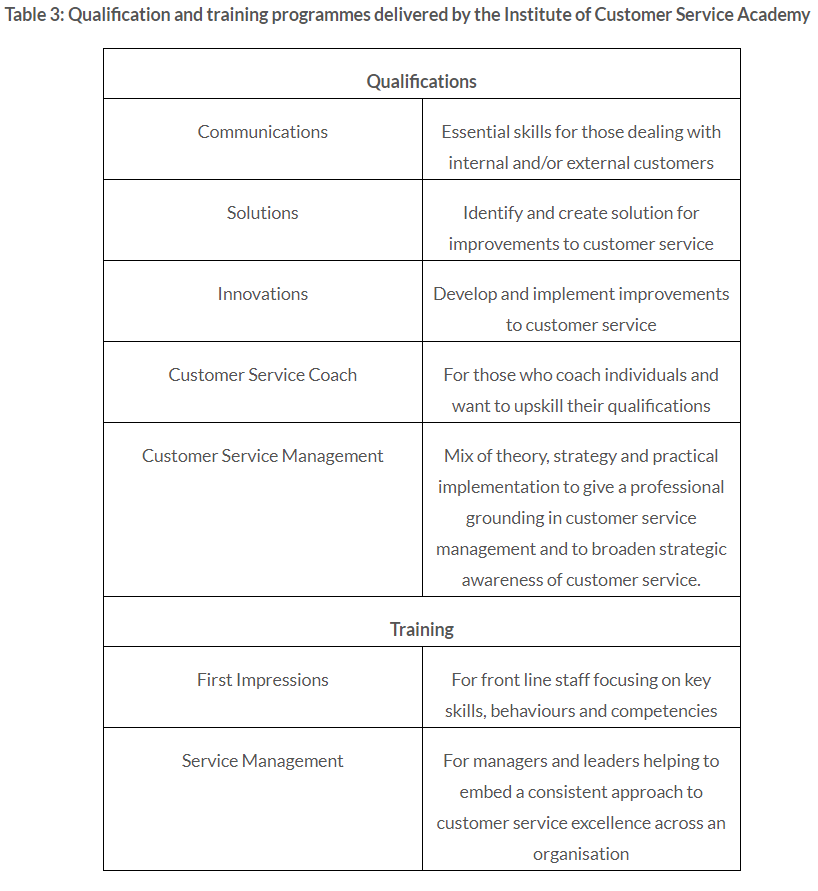The Institute of Customer Service’s evidence to the APPG for Education Inquiry: Do schools prepare young people for their future careers?
May 2016
The Institute of Customer Service is an independent not for profit professional membership body, with over 500 organisational members. Our purpose is to help organisations improve their business performance through excellent customer service and enable individuals to maximise their career potential and employability by developing their customer service skills.
1. Summary
Customer service skills are vital for the UK economy, with 79% of UK GDP generated by the service sector. These skills are essential for young people to develop as over 70% of the UK working population are employed in customer facing roles. Employers, adult education providers, schools and colleges as well as government all have a role to play in improving customer service skills. The government in particular should ensure all apprenticeships include an element on customer service to give young people the best start in their chosen career path.
Employers identify customer service skills as lacking in both applicants to jobs and in existing staff indicating these skills are ones that the education system as well as employer training programmes needs to be developing in young people. This skills gap exists across sectors and in all levels within organisations.
Foundation customer service skills and attributes that schools and colleges should focus on developing in young people include: communication skills, being relationship focused, the drive to achieve, teamwork, planning and organising, judgement and decision-making, and adding value.
Through the Institute of Customer Service, there already exists a body of expertise and customer service training programmes delivered via employers that can be used as a resource to create programmes suitable for young people. There are some existing areas of good practice that should be considered when looking to develop customer service skills programmes for young people. Firstly, there are the qualifications and training programmes developed by the Institute of Customer Service and secondly there is the Customer Service Practitioner Apprenticeship Standard that is part of the government Trailblazer apprenticeships scheme.
2. What should our schools be focusing on in order to prepare young people for the future? (Q1)
There should be a greater focus on customer service skills for young people to properly prepare them for future employment. Yet employers report that they are lacking in the workforce.
Customer service skills are vital for the UK economy
Over 70% of the UK working population perform roles that involve dealing directly with customers.
The service sector generates approximately 79% of UK GDP, and services are an increasingly important source of revenue for manufacturers. Quality and competence in customer service, therefore, has a significant impact on the quality of public services and the UK’s global competitiveness whatever the nature of our trading relationship with other countries. In a dynamic economy where people will move careers many times in their working lives, customer service competencies are a vital set of transferable skills all job hunters need to master. There is a role for schools and colleges in helping young people develop these early on in their lives. It is not just the responsibility of schools and colleges though; employers also need to consider the customer service skills of their employees across their organisations at all levels if they are to secure and improve their long term performance.
Whilst the core skills can be developed at a young age, customer priorities change meaning there is a need for continuous development that must be delivered by employers and adult education providers. There is significant untapped potential in the British economy and the UK would benefit from a renewed focus on customer service at all levels of education and training. Investing in customer service skills to remain competitive is what will drive productivity, exports and growth.
The customer service skills gap
Despite the importance of customer service skills to the economy, employers with skills shortages report that 39 percent of positions were vacant because applicants lacked customer handling skills. This skills gap is not just present in sectors traditionally associated with customer service. As can be seen in Table 1 below, employers across all sectors report these skills as lacking in applicants.
It is also not just in front line sales staff that there is a skills gap. Customer handling skills are important throughout an organisation, but Table 2 below shows that employers report a lack of customer handling skills at all levels. Note, for example, that employers report that 50 percent of managerial positions were vacant because of a lack of applicants with customer handling skills.
This highlights the relevance of customer service skills whatever role or industry a young person may wish to enter and their continuing importance throughout their career. Consequently, employers, adult education providers as well as schools and colleges should be focusing on developing service skills.
Customer service skills training for young people
There are many foundation skills for customer service that schools and colleges should focus on, as discussed below. It should be noted though that whilst classroom based learning is useful, experiential learning both at school and college and later through employer training is important. This is especially the case given the changing need of customers and therefore the need to continuously update skills. The Institute’s research into customer priorities suggests that customers’ needs have become more diverse and consequently the behavioural competences and skills required to engage them are changing. Customers are increasingly influenced by a desire for speed of service, a seamless experience across all mediums and channels and a more emotional, personalised connection with organisations and their employees.[7]
This highlights where customer service skills programmes for young people could focus – the ability to listen to, understand and then deliver for the customer. Do they, for example, have the ability to build relationships rather than focus on completing a transaction? Can they think about solutions to problems as they arise? Can they support customer demands in any environment – something increasingly important in the multi-channel world?
Many of the foundation skills required to deliver a good customer experience can be built into training or skills programmes suitable for young people that are not role-based. These skills can then be picked up either through apprenticeships or other employer led programmes later in someone’s career.
The key foundation customer service skills and attributes that schools and college should focus on are[8]:
• communication skills – making yourself understood; handling people; persuading others to fulfil promises made; and, familiarity with communications technology
• relationship focus – using communication skills and emotional intelligence to build effective relationships; owning the customers’ problems; and, addressing customers as individuals
• the drive to achieve – believing in yourself; overcoming obstacles; and, getting results
• teamwork – working together both in person and virtually; and, having a team understanding of the service ethos
• planning and organising – managing your time; setting priorities; and, keeping to commitments
• judgement and decision-making – ability to interpret service issues; understanding what decisions need taking, taking them at the right time and seeing them through
• value creation – adding value and making a difference by continually improving what we do and doing it now
• change orientation – the willingness to engage proactively with service enhancement initiatives; embracing, initiating and maintaining the pace of change
In order to develop future leaders in customer service, schools and colleges could also look at:
• leadership – understanding of organisational strategies and priorities; inspiring people to commit to the vision; coaching performance; and, building two-way communication
• risk management and compliance – identifying risks to business and ensuring they are effectively managed
Awareness of technologies and channels is also a useful skill to have for customer service. Delivering customer service via social media, for example, requires a dynamic mixture of skills including heightened competences in emotional intelligence, commercial awareness, risk management, judgement and style of communication.[9] Structuring a programme around their everyday personal interactions with businesses and other people via social media could be a useful way to engage young people in the need to develop these skills.
3. Who should be responsible for ensuring that young people develop soft, financial and entrepreneurial skills? (Q3)
We noted above the relevance of customer service skills at all levels in organisations and across all sectors as well as its importance to the economy overall. It is, therefore, important that there is a focus on customer service skills training at all levels of education and training, by employers themselves and by government.
As customer service is crucial to an organisations’ performance, employers in particular need to invest in the customer service skills of their staff. The importance of this to organisations is highlighted by the fact that of employers that had hard to fill skills shortage vacancies 49 percent had difficulties meeting customer services objectives because of overall skills shortages[10] and employers reported 46% of their existing staff with a skills gap lacked customer handling skills.[11]
Whilst ensuring that they have the right skills to thrive is a key objective for organisations there is much government can do, as customer service skills are essential for a healthy economy. Customer service skills provide all employees – and young people in particular – with a transferable set of skills which increase their employability across all sectors of the economy.
The government should ensure all apprenticeships include an element on customer service to give young people the best start in their chosen career path.
Do education providers have the resources to prepare young people for the workforce? (Q4)
Given the importance of customer service skills to the employability of young people and to the UK economy education providers and government should ensure the resources are available to provide skills training around customer service.
The Institute of Customer Service has already developed a set of comprehensive standards for customer service skills training and the Institute of Customer Service Academy is a centre of excellence providing end-to-end delivery, support and solutions for customer service people recruitment, development and retention. The existing body of expertise and the customer service training programmes already delivered via employers can be adapted into programmes suitable for young people.
An example of this is the work the Institute of Customer Service has undertaken through a pilot scheme with one organisation helping young individuals embarking on careers in the hospitality sector. The programme involved a two-week training programme and subsequent two-week placement in housekeeping, coffee shop, restaurant, bar and reception-based roles.
The programme included things such as training, interview practice, CV writing, mystery shopping and bed making exercises and participants of the programme were required to identify evidence of applying learned customer service skills and knowledge in real customer situations.
The standards are consistent with the skills and behaviours in the Institutes’ programmes and qualifications offered to those in employment. We do, however, draw from the standards created by the Institute and personalise them as appropriate. Please see Annex A for the complete set of standards.
5. What examples are there of employer-led initiatives that have had an impact? (Q5.b)
The Institute of Customer Service Academy delivers are range of programmes for customer service skills training via employers as described in Table 3.
These programmes help organisations improve the skills of their employees and in turn the service they provide to customers. As noted above, these proven qualifications and training programmes can be adapted to provide opportunities for young people to develop these essential skills.
In addition, the Institute of Customer Service acted as the expert professional body as part of the Customer Service Trailblazer Employer Group chaired by Boots UK which developed the new Customer Service Practitioner Apprenticeship Standard. This is an example of the apprenticeship system providing the vital soft skills young people need and that will be of huge benefit to employees and employers alike.
[1] Central Intelligence Agency, The World Factbook: GDP – Composition, By Sector of Origin https://www.cia.gov/library/publications/the-world-factbook/fields/2012.html (accessed May 2016) [2] Unpublished research by the Institute of Customer Service research, 2013 [3] Central Intelligence Agency, The World Factbook: GDP – Composition, By Sector of Origin https://www.cia.gov/library/publications/the-world-factbook/fields/2012.html (accessed May 2016) [4]UK Commission for Employment and Skills, Employer Skills Survey 2015: UK Results, (January 2016), Fig 2.5 p43 [5] UK Commission for Employment and Skills, Employer Skills Survey 2015: UK Results, (January 2016), Table A.2.11, p158. [6] UK Commission for Employment and Skills, Employer Skills Survey 2015: UK Results, (January 2016), Table A.2.9, p156 [7] The Institute of Customer Service, UK Customer Satisfaction Index – The state of customer satisfaction in the UK (January 2016), p35-43 [8] Dr Ted Johns, World-class Customer Service – the what, the why, the how, The Institute of Customer Service (2008), p43 [9] The Institute of Customer Service, Service goes social – From customer service to social intelligence (April 2015), p31-32 [10] UK Commission for Employment and Skills, Employer Skills Survey 2015: UK Results, (January 2016), Fig 2.6 p48 [11] UK Commission for Employment and Skills, Employer Skills Survey 2015: UK Results, (January 2016), Fig 3.4 p66






Comments (0)